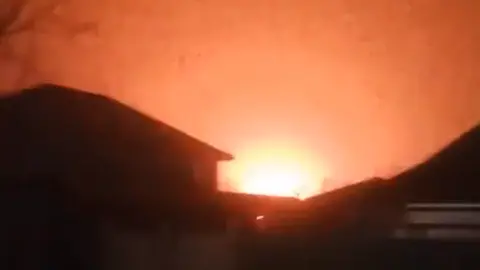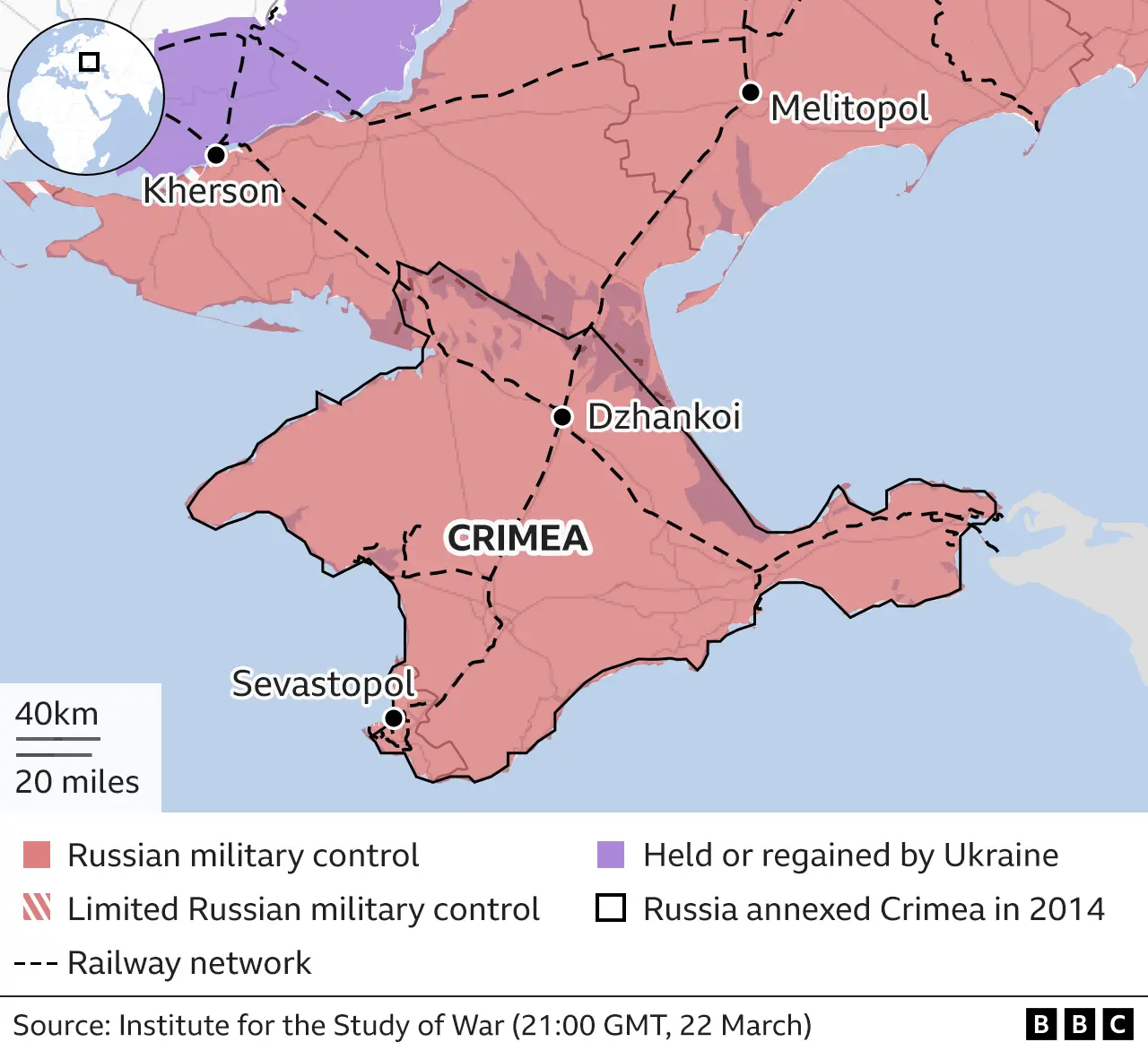Ukraine says Russian missiles destroyed in Crimea
 Sashakots/Twitter
Sashakots/TwitterAn explosion in the north of annexed Crimea has destroyed Russian missiles being transported by rail, Ukraine's defence ministry has said.
The Russian-installed head of the city of Dzhankoi said the area had been attacked by drones.
Ukraine announced the explosions but, as is normal, did not explicitly say it was behind the attack.
If confirmed, it would be a rare foray by Ukraine's military into Crimea, which has been annexed since 2014.
Russia has suffered attacks in Crimea before, but in most cases, responsibility has either been unacknowledged by Ukraine or blamed on some kind of partisan sabotage.
This strike, if confirmed, suggests that the capacity of the Ukrainian air force to deploy drones has increased.
Until now, Crimea has largely seemed out of the range of Ukrainian missiles. But this attack indicates that a drone at least can reach deeper behind Russian lines than previously thought.
The "mysterious" explosions destroyed Russian Kalibr-NK cruise missiles, intended for use by Russia's Black Sea Fleet, Ukrainian defence intelligence said. Kailbr missiles have been widely used in attacks on Ukrainian cities and infrastructure in recent months.
One unconfirmed report from a resident cited on Ukrainian TV spoke of "booms" that went on for 30 minutes, leaving part of Dzhankoi with no electricity. The blasts "continue the process of Russia's demilitarisation and prepares the Ukrainian peninsula of Crimea for de-occupation", the defence ministry said.


Dzhankoi has been used by Russian forces as a rail hub between Crimea and other areas of occupied Ukraine. Russian TV reports said that Tuesday's strike had not caused any damage to rail infrastructure.
Russia's investigative authority said a residential building and a shop were damaged, according to initial findings. All the targets were civilian, it claimed.
Ihor Ivin, the Russian-installed administrator, said a 33-year-old man was taken to hospital for treatment for a shrapnel injury from a downed drone. He made no mention of any military targets being damaged.
Several buildings caught fire and the power grid was damaged, Mr Ivin was quoted as saying by local media. Another Russian-appointed official said a drone had been hit over a technical school, between an instruction area and a student residence.
Russia's top official in occupied Crimea, Sergei Aksyonov, said air defences near Dzhankoi had been activated and the situation was under control. He urged residents not to pay attention to "fakes disseminated by Ukrainian propaganda".
Last August, an ammunition depot was targeted near Dzhankoi. Weeks later, Russia blamed Ukraine for carrying out a drone attack on the Black Sea Fleet in the Crimean port city of Sevastopol in which a warship was damaged.
This latest attack suggests Kyiv is determined to continue harrying the supply chains of Russian forces, targeting in particular its stock of missiles, as well as the routes along which they may be transported into southern occupied Ukraine via Crimea.
Speaking on Ukrainian TV, military spokeswoman Natalia Humeniuk reminded viewers that Dzhankoi was a hub station for the occupying force and that, from the start of the Russians' full-scale invasion, it had been made clear that defeating their logistics would play a big part in the future status of Crimea.
Kyiv has a political incentive to keep Crimea in the news, too: a reminder that its current objective is not just to force Russian forces out of those areas captured since February last year, but also from the Black Sea peninsula annexed illegally in 2014.
In a separate development, authorities in southern Russia accused Ukrainian forces of using a drone to target a pumping station on an oil pipeline north of the Ukrainian border. The governor of Bryansk region said there were no casualties.
